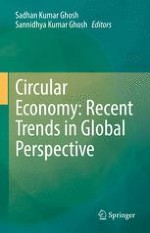Abstract
The article is devoted to the transition processes of Russia to a circular economy. A comparative analysis of waste accumulation and its treatment in Russia, as well as in developed and developing countries is carried out. In the Russian Federation there has been a steady increase in the total amount of waste for the last decade, the vast majority of which is generated as a result of mining. At the same time, just over half of the total production and consumption waste amount is disposed of. An analytical review of current ideas about the circular economy is represented.
The concept of a circular economy emphasizes the need to use raw materials in a cycle that includes the sphere of consumption. It is assumed that such a cycle can be closed within the framework of eco-industrial structures (parks, networks, etc.). In natural ecological systems, the wastes of some organisms are used by other organisms, i.e. a self-regulating biogeochemical cycle of substances is carried out. А consciously organized and human-controlled technogenic cycle of raw materials, products, and waste should be the basis of circular economy. The prospects of resource cycles introduction in the Russian Federation are evaluated.
The examples of the raw material complex use are analyzed, including the scheme for apatite-nepheline ore processing, thermal processing of fuel (coal, oil, shale), and pyrolysis of oil. The recycling of production waste into secondary material or energy resources is considered as an important area of resource cycle optimization. The article describes the resource cycle of waste stream formation in the timber industry. The prerequisites for using the circular economy model in the Russian Federation are considered in the article. In particular, it points to the specifics of the country’s energy balance (a high share of renewable energy sources due to the potential of hydrogenation); to a significant area of forests that make a huge contribution to ensuring the stability of the world’s biosystem; to state support (stimulation of the introduction of energy-saving and resource-saving technologies). The goals of the 2018 Russian government are analyzed. National project “Ecology,” including effective management of production and consumption waste, including the elimination of all unauthorized landfills identified on January 1, 2018 within the borders of cities; drastic reduction of air pollution in major industrial centers; improving the quality of drinking water for the population, including residents of localities that are not equipped with modern centralized water supply systems; conservation of biological diversity. The national project provides for the implementation of the Federal project “Introduction of the best available technologies.” A prerequisite for a closed-loop economy in Russia is also the world’s leadership in reducing the volume of associated petroleum gas flaring. In addition to technological needs, gas is almost completely used in petrochemical plants for the production of polymers.
Specific tasks have been set for the transition of the country’s economy to a circular economy, which consists in increasing the level of reuse of municipal waste; increasing the level of reuse of packaging; banning landfills of any recyclable and biodegradable waste. The implementation of these tasks requires a change in the way of thinking, a breakthrough in such creative disciplines as design, advertising, and digital technology.
The article notes that most manufacturers in Russia make decisions in the short term, relying only on making profits in the near future, and often deny the viability of a cyclical approach, citing their experience. However, the transition to a cyclical economy is the only way for development to take into account and minimize environmental consequences when creating a product, rather than fighting them after the product is released.
The article summarizes the results of pilot projects to improve the collection, sorting, recycling, and disposal of waste, that is, the global garbage reform. It is shown that the country is learning to handle its waste in a new way, that a fundamentally new system is being actively formed, in which most of the garbage will be sent for recycling. Consequently, the foundations of a cyclical economy are being developed.
